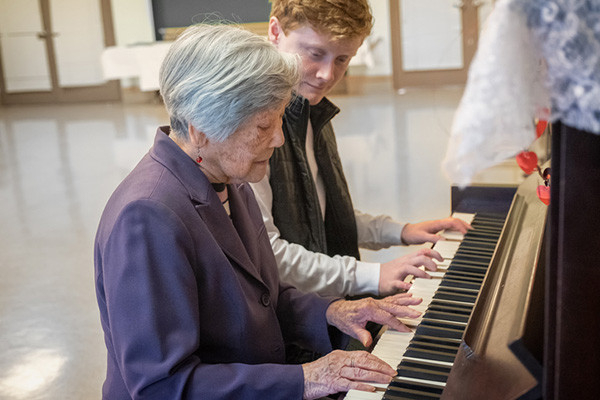Music boosts our mood and well-being, and music therapy may help during treatments for certain health conditions.

Times are hard. The current political climate, war, impact of global warming, continued inequities due to systemic racism, and ongoing physical and mental health challenges from COVID are taking a toll on our feelings of safety in the world and quality of life. Hopefully, each of us can find moments of ease and temporarily shift our thoughts away from the difficult daily news. For many people, music can play a role in making that shift, even incrementally.
How can music impact our quality of life?
Recently, researchers looked at the impact of music interventions on health-related quality of life, and tried to answer the question about the best way to help make that shift toward release, relaxation, and rehabilitation. This recent systematic review and meta-analysis (a study of studies) showed that the use of music interventions (listening to music, singing, and music therapy) can create significant improvements in mental health, and smaller improvements in physical health–related quality of life. While the researchers found a positive impact on the psychological quality of life, they found no one best intervention or “dose” of music that works best for all people.
Complexities of music
As complex human beings from a wide variety of cultures, with a variety of life experiences and mental and physical health needs, our connection with music is very personal. Our relationship with music can be a very beautiful, vulnerable, and often complicated dance that shifts from moment to moment based on our mood, preferences, social situation, and previous experiences. There are times where music can have a clear and immediate impact on our well-being:
- easing a transition to sleep with a soothing playlist
- finding motivation for exercise by listening to upbeat dance music
- aiding self-expression of emotions by singing
- connecting to others by attending a live musical performance.
There are other times when a board-certified music therapist can help you build that connection to music, and find the best intervention and “dose” that could positively impact your health and provide a form of healing.
How can music be used as a therapeutic tool?
Music therapy is an established health care profession that uses evidence-based music interventions to address therapeutic health care goals. Music therapy happens between a patient (and possibly their caregivers and/or family) and a board-certified music therapist who has completed an accredited undergraduate or graduate music therapy program.
Music therapists use both active (singing, instrument exploration, songwriting, movement, digital music creation, and more) and receptive (music listening, guided imagery with music, playlist creation, or music conversation and reminiscence) interventions, and create goals to improve health and well-being.
Some of those goals could include decreasing anxiety, shifting your mood, decreasing pain perception during cancer or other medical treatment, increasing expression, finding motivation, and many others. The approach to using music to achieve these kinds of goals — and to improving your quality of life in general — can shift from moment to moment, and a music therapist can help you find what works best for a particular situation.
My top music therapy tools
Listening
This intervention has been studied the most, in almost every scenario. It can be done either on your own or in music therapy. The music can be live or recorded. Listening can be done with intentional focus or as background listening. You can amplify emotions for release. You can use music to quiet the mind. Or you can utilize the “iso principle” and match music to your current energy or mood, and then slowly change feel, tempo, and complexity to help you shift. Music listening can be paired with prompts for relaxation, or to motivate you to exercise, move more, or do a task you’ve been putting off.
Learning or playing an Instrument
Active music-making truly engages your entire brain. This creates the most potential for distraction, pain reduction, cognition, fine and gross motor development, and expression. Some instruments are designed for easier access to free expression or learning.
A steel tongue drum, for example, set up in a pentatonic scale, has a beautiful resonant sound, has no “wrong notes,” and by design allows you to just play! If you want to engage your cognitive brain a bit, try learning the ukulele. The strings are easy to push, beginner chords only need one or two fingers, and there are many great ukulele resources online. Making music with an instrument can be fun and easy.
A board-certified music therapist can help you find the most direct and success-based path to musical expression. Learning how to really master an instrument and read music takes time, patience, and practice.
Singing
This can be an amazing intervention if you have a good connection to your voice and/or have a good music therapy relationship where the therapist can help you build your connection to your instrument. There are physical benefits of singing on lung function and emotional benefits of singing lyrics that speak your truth. Finally, there is the community connection and power of being surround by strong, tight harmonies.
The bottom line
Although there is not one best intervention, magical song, or perfect genre to make all the hard things in life easier, music can be a powerful agent of change.
Need some extra help finding the best music tools for you? Here are some resources for exploring music therapy and finding certified therapists.
American Music Therapy Association
Certified Board of Music Therapists
American Psychological Association: Music as Medicine
About the Author

Lorrie Kubicek, MT-BC, Contributor
Lorrie Kubicek is a board-certified music therapist at Massachusetts General Hospital, co-director of The Katherine A. Gallagher Integrative Therapies Program, and program manager of expressive therapies at MGH Cancer Center and Mass General Hospital for Children. … See Full Bio View all posts by Lorrie Kubicek, MT-BC